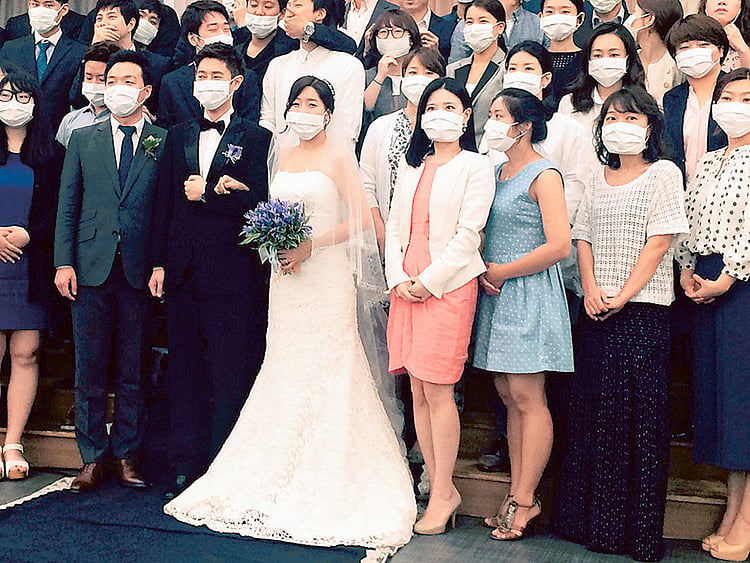Seoul: South Korea on Tuesday reported its seventh death from Middle East Respiratory Syndrome (Mers) as the government — concerned about the economic impact — said it hoped to end the crisis this week.
Eight new infections brought the total number of cases to 95 in the largest outbreak outside Saudi Arabia, following the diagnosis of the first patient back on May 20.
The virus has caused widespread public anxiety and led to a plunge in cinema ticket sales and dwindling attendance at baseball games and other public events.
“Public concerns are rising over the negative impact of the Mers outbreak on our economy and society,” Acting Prime Minister Choi Kyung-hwan said during a meeting with top health officials.
“So we have decided to... launch an active, all-out response with the goal of ending the Mers crisis within this week,” said Choi, who is also the finance minister.
The latest fatality was a 68-year-old woman who was infected by a Mers patient at a hospital in Seoul.
All the infections so far have been restricted to hospitals, and the ministry stressed that all seven who died had pre-existing health problems.
The virus is considered a deadlier but less infectious cousin of Severe Acute Respiratory Syndrome (Sars), which killed hundreds of people when it appeared in Asia in 2003.
There is no vaccine or cure for Mers which, according to World Health Organisation (WHO) data, has a fatality rate of around 35 per cent.
“People may be concerned, but I hope that they will not overreact and cooperate to ensure that economic activities will not be weakened,” President Park Geun-hye told a cabinet meeting.
The outbreak has hit the tourist industry, with more than 45,000 scheduled visitors — mostly Chinese — cancelling trips to South Korea in the first week of June, the Korea Tourism Board said.
Hong Kong issued a “red” alert on Tuesday, advising against non-essential travel to South Korea for health reasons.
In response, the foreign ministry in Seoul pointed out that the WHO had not recommended any such travel restrictions due to the Mers scare.
Infectious disease specialists from around the world began probing the outbreak amid criticism that officials took too long to implement infection-control measures.
“They missed opportunities to contain the virus at the very beginning,” said Leo Poon, an associate professor at the University of Hong Kong’s School of Public Health. The first infected “patient was not diagnosed with Mers for a long time, which means he had opportunities to shed Mers for quite a while and could have infected more people in that period.”
An eight-person team convened by the World Health Organisation began studying on Tuesday how 95 people were infected with the virus — seven of them fatally — and will offer recommendations to contain the epidemic, said Alison Clements-Hunt, a WHO spokeswoman in Manila.
“This mission should bring us a step closer to having a better understanding of the nature of the virus,” she said.
‘Mishandled’
Mission participants, invited by South Korea’s health ministry, include Keiji Fukuda, WHO’s assistant director-general for health security; Abdullah Assiri, a health official from Saudi Arabia; Martin Cetron, director of global migration and quarantine at the US Centres for Disease Control and Prevention; and Malik Peiris, director of the University of Hong Kong’s School of Public Health.
“Infection control has dramatically improved,” said Michael Osterholm, director of the University of Minnesota’s Centre for Infectious Disease Research and Policy in Minneapolis, who has had discussions with South Korean investigators though isn’t part of the mission.
Health officials need to continue tracking down and checking everyone in contact with an infected person, he said.
While the South Korean response to MERS-CoV is “very encouraging,” the initial response was mishandled, said Benjamin Neuman, a virologist at the University of Reading’s School of Biological Sciences.
“It took 11 days from the announcement of the first case until the major effort to find and isolate contacts of infected people got under way,” Neuman said. “Eleven days is a long time for a virus like Mers — enough time to infect a second wave of cases and begin a third, as we have seen.”
Sign up for the Daily Briefing
Get the latest news and updates straight to your inbox
Network Links
GN StoreDownload our app
© Al Nisr Publishing LLC 2026. All rights reserved.
